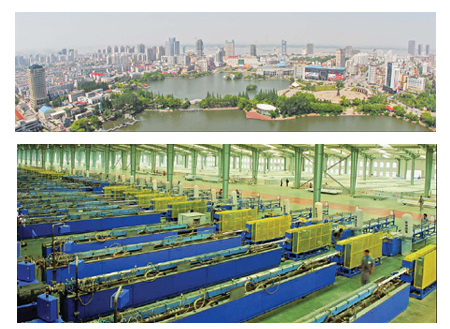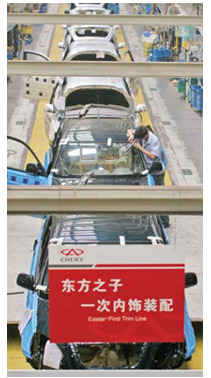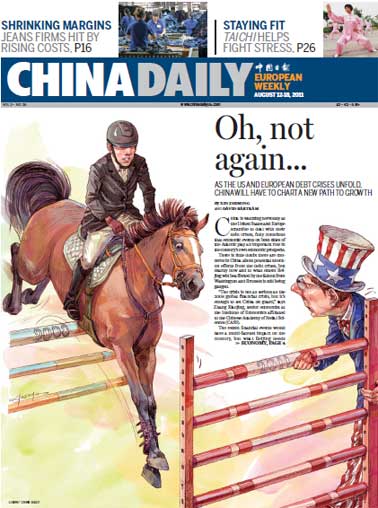Wuhu goes the distance
Updated: 2011-08-05 13:25
(China Daily European Weekly)
City sees a new spurt of industrial resurgence as more Chinese companies move inland

Top: A bird's-eye view of downtown Wuhu. Above: The Conch production line at the Wuhu Economic Development Area.
|
For factory worker Liu Chunjing it was a sweet homecoming when after five years of hard labor at a factory in Shanghai she decided to join the production line of an automobile parts company in Wuhu, a city in East China's Anhui province. "Though the payment is less, it is closer to home and I can visit my parents often. Besides the living costs in Wuhu are not as high as in Shanghai and I can save more money," the 28-year old Liu says. Many industrial workers like Liu are returning to cities like Wuhu, as growing domestic demand, lower production costs, improved infrastructure, favorable investment policies and easy availability of labor are propelling more companies to move their production bases to regions such as Anhui, Hubei and Jiangxi provinces.
So much so, that in a turnaround of sorts, cities like Wuhu, which was once known as major labor provider for the country's coastal areas, is now a major job provider.
|
 The production line of Chery Automobile. Photos Provided to China Daily
|
Situated on the Yangtze River, Wuhu was always an important trading center thanks to it being the fifth largest port along the Yangtze River. But the current round of ongoing industrial transformation is likely to make the city a major manufacturing hub in China.
Yang Jingnong, mayor of Wuhu, says the advantages of Wuhu are so obvious that it has attracted both domestic and overseas companies.
"We are talking about advantages not only in terms of natural resources, but also in terms of the investment environment," Yang says.
"Wuhu has the largest port on the Yangtze River for coal transport and the largest bulk shipment center in Anhui. At the same time it has an attractive investment environment and favorable taxation, finance and land policies."
Leading the industrial surge in Wuhu are companies such as carmaker Chery Automobile and a host of other auto parts companies. But in recent times several big appliance makers such as Midea and Gree have also set up shop in Wuhu.
Situated 400 kilometers west of Shanghai, Wuhu is just a two-hour drive from Nanjing, capital of Jiangsu province. It is also an important rail hub in eastern China and has five major railway lines passing through it.
The Beijing-Kowloon and Beijing-Guangzhou lines in the west and the Beijing-Shanghai line in the east are expected to connect Wuhu with other major economic regions in the north and the south.
Midea Group, the Guangdong-based home appliance manufacturer, is one of the recent investors and has pumped 5 billion yuan (540 million euros) into its factories in Wuhu.
With its low labor and operating costs, Wuhu has become Midea's second-largest production base in China, following Shunde in Guangdong province.
He Xiangjian, chairman of Midea Group, says the Wuhu facilities will help drive growth for the home appliance maker.
"It (Wuhu) is a vital cog in our business prospects, and we plan to increase our investments further."
Gree has invested 2 billion yuan in setting up its manufacturing plant in Wuhu.
E-paper

Going with the flow
White-collar workers find a traditional exercise helps them with the frustrations of city life
The light touch
Long way to go
Outdoor success
Specials

Star journalist remembered
Friends, colleagues attended a memorial service to pay tribute to veteran reporter Li Xing in US.

Robots seen as employer-friendly
Robots are not new to industrial manufacturing. They have been in use since the 1960s.

A prosperous future
Wedding website hopes to lure chinese couples
